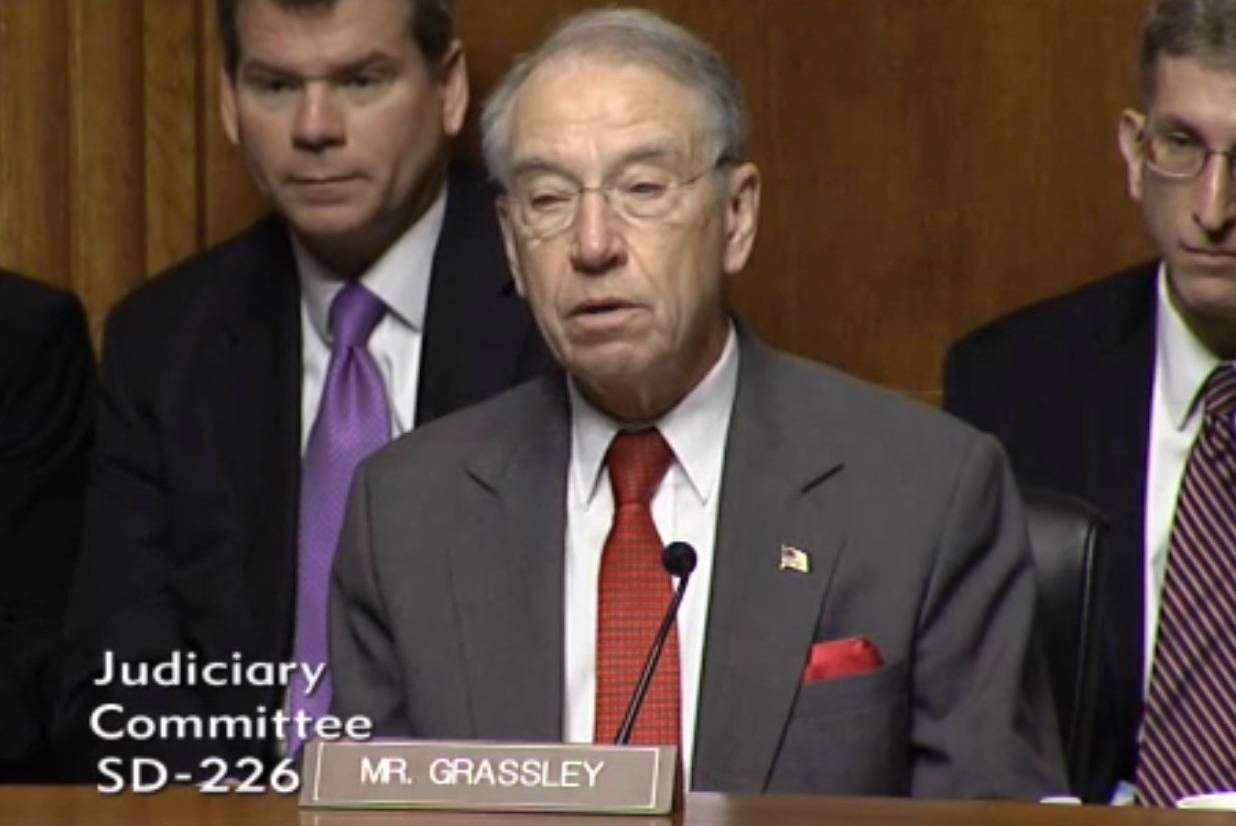Chuck Grassley's Demands Make Sentencing Reform Weaker
At the insistence of the powerful senator, a new bill shortens fewer sentences and lengthens others.

Republican and Democratic leaders in the Senate reportedly have reached agreement on a package of criminal justice reforms that they plan to unveil today, including shorter sentences for some drug offenders and a greater emphasis on rehabilitation. Since the proposed legislation is supported by Senate Judiciary Committee Chairman Chuck Grassley (R-Iowa), an unreconstructed drug warrior and fan of mandatory minimum sentences, you can be sure it does not go as far as it should and includes elements that are hard to swallow. But on balance it sounds like a step in the right direction.
"It's not fair to characterize it as a sweeping overhaul," an unnamed "congressional aide" told The Washington Post. "It is actually much less than what the advocates have been hoping for." Another unnamed source, who works for "one of the most prominent right-leaning groups involved in criminal justice reform," described the bill as "more than you think, but probably not as much as people will want."
According to MSNBC's Ari Melber, the proposal would "end the federal 'three strikes' rule." Presumably that refers to the mandatory life sentence for people convicted of three drug offenses, as opposed to the mandatory life sentence for people convicted of two "serious violent felonies" plus a "serious drug offense." The Smarter Sentencing Act, introduced by Sens. Mike Lee (R-Utah) and Richard Durbin (D-Ill.) last February, would change the former sentence to a 25-year term.
Politico reports that the new bill "give judges more discretion to override a mandatory minimum," which may refer to expansion of the "safety valve" for low-level, nonviolent drug offenders, another element of the Smarter Sentencing Act. Melber says the package would "limit the use of mandatory 10-year sentences for offenders who have not committed violent or major felonies." That sounds like a watered-down version of yet another Smarter Sentencing Act provision, which would have cut the five-, 10-, and 20-year mandatory minimums for drug offenses in half.
Similarly, the Smarter Sentencing Act would retroactively apply the lighter crack penalties approved by Congress in 2010, allowing thousands of current prisoners to seek shorter sentences. While Politico says the Grassley-backed bill "would apply the Fair Sentencing Act of 2010…retroactively," Melber says it "would apply some of that reform retroactively." I'm not sure what "some of that reform" means, but it is obviously wrong to make any prisoners complete sentences that pretty much everyone now agrees are too long. Even Grassley apparently supported shorter crack sentences in 2010, since the Senate approved them by unanimous consent. So what possible justification can he have for opposing full retroactivity?
Grassley's influence also can be seen in provisions that increase the use of mandatory minimums. Melber says the new bill would "expand mandatory minimum sentences for certain offenses, enhancing their use to punish selected firearm crimes and creating new mandatory minimums for offenses related to domestic violence and supporting terrorism." Melber suggests these changes "may address one of the common criticisms of the current federal application of mandatory minimums, which can result in heavier penalties for drug crimes than far graver offenses, such as violent crime."
Given that current firearm-related provisions dictate draconian penalties for people who never actually wield a gun, let alone hurt anyone with it, I am not at all optimistic that longer sentences for "selected firearm crimes" represent an improvement. Likewise with "new mandatory minimums" for "supporting terrorism," which can include nonviolent actions such as donating money to the wrong charity or even exercising the right to freedom of speech.
The Smarter Sentencing Act was already a compromise compared to the Justice Safety Valve Act, a bill backed by Sens. Rand Paul (R-Ky.) and Patrick Leahy (D-Vt.) that would have eliminated mandatory minimums. Yet Grassley called the less ambitious bill "lenient" and "dangerous," since it would lighten penalties for offenses involving substantial amounts of drugs and manufacture, smuggling, or distribution. He conflated such offenses with violence, which means he either does not understand what that word means or does not understand how the current law works. It's a shame that reformers in the Senate must kowtow to such a mindlessly punitive demagogue.
Update: FAMM describes the new bill's provisions in more detail, calling it "the most significant…sentencing reform legislation in a generation."


Show Comments (26)